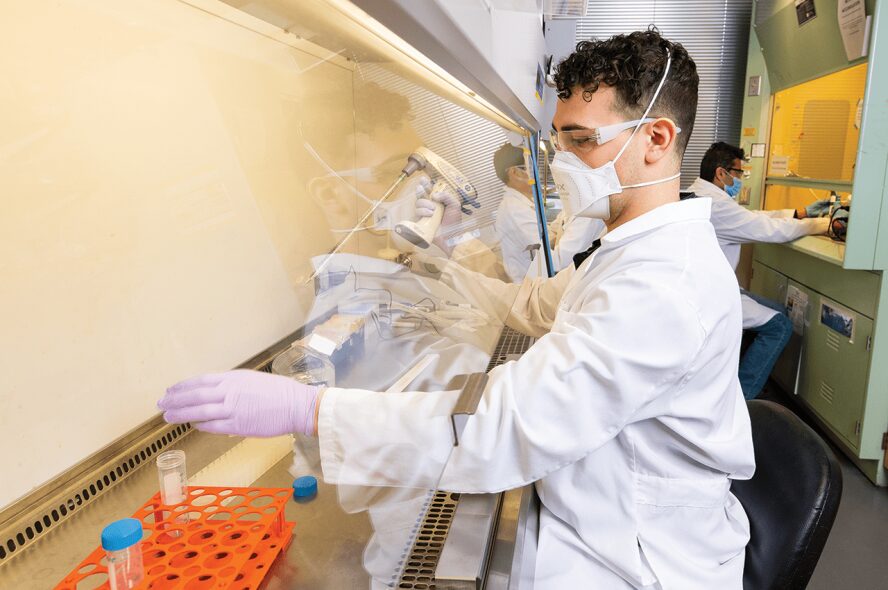While Other States Ban Cultivated Meat, Massachusetts is Investing in Alternative Proteins
7 Mins Read
A new economic bill in Massachusetts pledges investment into alternative proteins, with Senator Barry Finegold calling food science a climate and health priority for the state.
If you’re caught trespassing or creating a public nuisance in Florida, you could go to jail for two months. Same thing if you sell cultivated meat.
The debate around alternative proteins has become increasingly polarised in the US, with many policymakers trying to create a divide among partisan lines. Florida has banned companies from making or selling cultivated meat in its borders. From October, so too will Alabama.
A number of other states – Texas, Nebraska, Tennessee and Arizona, to name a few – have discussed similar legislation. Heck, some in Washington are even trying to restrict federal funding and ban cultivated meat in schools.
That said, the White House and states like California and Illinois have been pouring in millions to support alternative proteins, signalling that not everyone finds a modern piece of chicken a threat to farmers, the economy, and the fabric of American society.
Massachusetts – home to Tufts University and its Center for Cellular Agriculture – is one of these proponents. In its new Economic Development Bill, passed last week, the Bay State has put its weight behind climate tech and alternative proteins.
“We feel that food science is going to be a big part of the future. And food science is not only good for the economy, it’s good for the climate, and it’s good for our health,” state Senator Barry Finegold, chairperson of the Joint Committee on Economic Development and Emerging Technologies, tells Green Queen.
“We are looking at trying to help grow our companies and helping them with research, helping them with infrastructure, and helping them develop their products,” he adds.
“Massachusetts recognises the economic benefits of this sector, the enormous job creation potential, the climate benefits, and the ability for alternative proteins to help tackle food insecurity and a slew of individual and public health issues,” notes Noa Dalzell, state policy director at non-profit Food Solutions Action.
“The state has historically been at the forefront of emerging technologies and innovation, and this alternative protein investment signals it will continue to lead on the most critical new innovations in sustainability,” she says.
Massachusetts looks to be ‘food tech leader’ globally
As part of the Economic Development Bill (S.2856), the Massachusetts Senate is pledging $2.8B in funding, with grants for climate tech and adaptation finance for coastal municipalities. The House version of the bill (H. 4804) – passed in June – is effectively the same.
Alternative proteins appear thrice in the list of investments. First, there’s a $5M grant to local companies in support of developing these novel foods, who can apply for the funding via state VC firm MassVentures’ START programme. This involves the assistance of a Small Business Innovation Research or Small Business Technology Transfer grant from federal agencies like the USDA, the FDA or the National Science Foundation.
Another $5M is earmarked for the Massachusetts Technology Collaborative (MassTech) – a public agency – to match grants that support alternative proteins among private entities, higher education institutes, NGOs, and other organisations in the state. These grants must be administered in alignment with the goals and priorities of the state’s manufacturing collaborative, and promote “geographic, social and economic equity”.
Finally, the government will pour in $115M for a competitive programme by MassTech, centred on infrastructure support to advance the state’s leadership and increase jobs in key emerging tech sectors. This includes developing alternative proteins – with the bill namechecking plant-based, fermented and cultivated foods – with “sensory characteristics that are consistent with conventional meat and dairy”.
“What we’re focused on right now is trying to encourage companies from all over the country to come here, and we feel that with our package, I think it’s very enticing for people to come to Massachusetts,” says Finegold.
When it comes to food tech, he adds that the state is looking “not only to be a leader in the United States, but also to be a leader around the world”. Countries like Singapore, Israel and now the UK have all made progress with regulatory approvals. And two companies have received clearance to sell cultivated meat in the US, and both are from California.
Meanwhile, as part of a $100M pledge, the Bezos Earth Fund opened a Center for Sustainable Protein in North Carolina State University in May to advance alternative protein research.
‘Lawmakers have to take science seriously’

Massachusetts’ bill is a big vote of confidence for alternative proteins – particularly cultivated meat, which has been marred by dubious claims about being unnatural, unhealthy and even bad for the climate.
This industry needs a win, and Finegold’s recognition that it’s good for the economy, health and environment has delivered that.
I ask the Senator what he thinks about the bans in Florida and Alabama. “I’m not concerned about what other states are doing,” he said. “What I’m focused on is what Massachusetts is doing and I’m very proud that Massachusetts is a leader when it comes to trying to preserve the world, make a healthier society, and create economic opportunity for its people.”
Perhaps not surprisingly given the state of US politics today, he doesn’t believe support for alternative proteins is an issue that would sway a person to vote or not vote for someone. “I think it’s incumbent on us lawmakers to think long-term,” he says. “If we’re concerned about climate change, if we’re concerned about people’s health, then I think we have to take science seriously. And that’s what we’re doing here in Massachusetts.”
Does he believe these restrictions hinder consumer choice and climate action? “I was travelling yesterday. I was at the Delta Lounge and they had plant-based chicken, and I didn’t see anybody hesitating to eat that type of food. So I just think it takes time,” he responds.
“And I think Massachusetts has always been a leader in challenging thought, and getting people to change their behaviours, and how they think about things.”
Finegold said the final points of the bill are still being negotiated, but expects it to be finalised in the next few weeks. When asked about foreign investment and talent, he says the state is ready for “all businesses in food science and technology with open arms.”
“Massachusetts has always been an open state, and welcomes talent from all over the world to come here and work with our companies,” he adds. “Whether the companies decide to take investment from domestic or international, that’s ultimately up to them.”
US states ‘recognising’ the potential of alternative proteins

A recent poll showed that cultivated meat acceptance skews higher among Democrats than Republicans. With Donald Trump picking a climate sceptic in JD Vance as his running mate, how would the upcoming election affect this sector?
“Both Republican and Democratic administrations over the years have supported agencies conducting this research, and we’re grateful to have bipartisan support for this research area needed for a more secure food future,” Dalzell states.
“As you can see in this official statement, under President Trump, USDA secretary [Sonny] Perdue and FDA commissioner [Scott] Gottlieb expressed support for the proposed USDA/FDA framework of overseeing cultivated meat regulation.
Speaking at the IFT First trade event this week, Bruce Friedrich, president of alternative protein think tank the Good Food Institute, said he expects the cultivated meat bans in Florida and Alabama to be “quietly repealed”, at least “before they’re meaningful”. He labelled it as “no big loss”, as companies don’t need to sell in these states anytime soon.
But Nusa Urbancic, CEO of the Changing Markets Foundation, suggested otherwise in a chat with Green Queen: “I think the Big Ag has only got started when it comes to bans and restrictions on its competition. Without a very smart and well-resourced counteroffensive, the troubles for the alternative protein industry could continue.”
Dalzell believes it’s hard to gauge exactly where things are going to go. “But what I can say is that states across the country are recognising this is a sector that needs to be invested in because of both the economic potential and its ability to tackle a myriad of social issues,” she explains.
“Perhaps most importantly, because meat demand is projected to double over the next 25 years, states are recognising they need to invest in alternatives to complement existing protein forms.”



